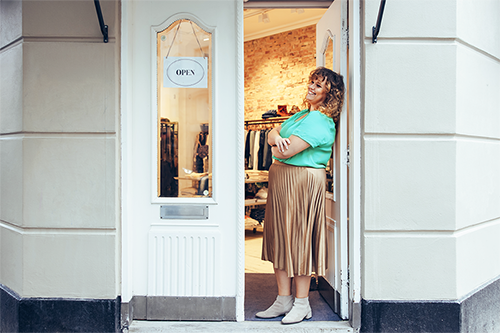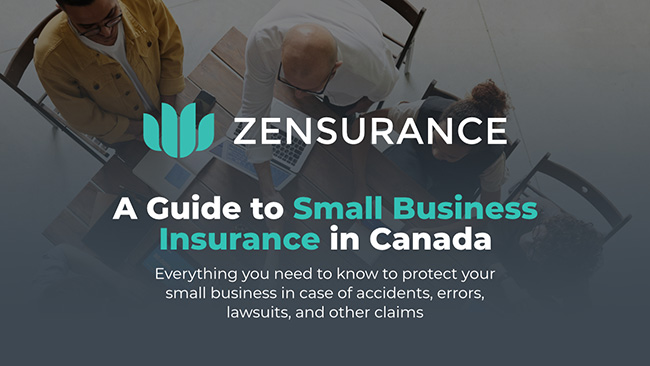Protecting your company from expensive risks and liabilities should be a key consideration and a significant portion of your overall risk management strategy. A comprehensive business insurance policy not only provides financial protection but also offers peace of mind, serving as the foundation of your risk management strategy.
However, a recent Zensurance survey of 1,000 Canadian small business owners found 33.6% of respondents don’t have commercial insurance. When we asked these uninsured business owners how they’d pay for unexpected damages and losses, 22% said they had enough money saved to cover the costs, followed by:

Related Posts
Categories
- 15.7% would try to get a loan from a financial institution
- 11.2% don’t know what they’d do
- 10.8% don’t believe there is a potential for expensive losses or damages to their businesses
- 8.6% would try to borrow money from family or friends
- 7.5% would declare bankruptcy
- 4.9% would sell their businesses
None of these perspectives is a practical plan to safeguard their financial wellbeing. Resolving even one legal dispute, accident, or injury to a customer or other third party could cost tens of thousands of dollars.
Let’s face it: there are downsides to owning a business. Any number of things can go sideways unexpectedly, and as the business owner, the onus is on you to deal with those situations, such as:
- A customer or delivery person visiting your store or office stumbles over uneven carpeting or flooring and tumbles to the ground. They fracture a wrist or ankle and demand you pay for their medical expenses.
- Your shop is burglarized in the middle of the night, and office equipment, electronics, and merchandise are stolen.
- A sudden and violent windstorm descends on your community and severely damages the roof of your warehouse.
- One of your employees accidentally damages expensive furniture while doing form or installation work inside a customer’s home or while making a delivery.
Different types of insurance coverages exist for each scenario above to provide protection or financial support for such possibilities.
Among them are premises liability and general liability insurance. Each covers different liability aspects related to your business property and operations. Here’s a quick breakdown of what these two essential coverages provide:
What Is Premises Liability Insurance?
Although there may be some overlap between the two, premises liability insurance is not the same as general liability insurance.
Sometimes referred to as basic liability, premises liability insurance provides financial support for third-party bodily injuries to customers or visitors that occur on a commercial property or at a home-based business because of unsafe conditions. In either scenario, think of the areas where you and your staff work, including:
- An office, studio, warehouse, or retail store
- The walkway and entrances to your business property
- The land around your business property
- The driveway and parking lot at your property
However, because it’s limited in scope, premises liability doesn’t cover third-party injuries to others that occur elsewhere than your business property.
What Is General Liability Insurance?
General liability insurance, or commercial general liability insurance, is broader in scope, and includes premises liability insurance. It covers third-party bodily injury or third-party property damage on your business property and elsewhere, such as at a client’s location.
Its coverage is more extensive. It includes premises liability and a host of other protections such as product liability, contractual liability, and tenants’ legal liability insurance.
Because general liability offers more comprehensive protection, it also costs more than a premises liability policy. Furthermore, it provides financial support if you are sued for damages by paying for your legal fees and any out-of-court settlement or compensation awarded to the plaintiff by the court.
How Does Premises Liability and General Liability Insurance Cover Shared Properties?
If you are a tenant of a mixed-use commercial building or a retail plaza and don’t own the commercial space where your business operates, you need either premises liability or general liability insurance.
Although your landlord may be responsible for maintaining common areas of a shared property, such as lobbies, corridors, walkways, and entrances, check the terms of your lease to be sure.
How to Get Low-Cost Business Property Insurance
Protect your assets and finances with a low-cost, customized business insurance policy from Zensurance.
Fill out our online application for a free quote in less than five minutes.
Our licensed brokers will shop our partner network of more than 50 insurers to find the policy that best suits your needs. They can also answer any questions you have to ensure your protection.
– Updated September 4, 2024.
Related Posts
What Type of Insurance Does a House Cleaner in Canada Need? (Coverage Explained)
House cleaners provide an essential service to Canadian households, but even small accidents can lead to costly claims. Here’s the insurance coverage professional house cleaners in Canada need to protect their businesses and income.
What Is Hired and Non-Owned Commercial Auto Insurance?
If your business rents or leases vehicles, or if employees use their own cars for work, hired and non-owned commercial auto insurance can help protect your business from costly accidents and liability claims. Here’s what Canadian business owners need to know.
What Is a Deductible in Small Business Insurance? (Definition, Examples & How It Works)
A deductible is the amount your small business pays out of pocket when you file an insurance claim. Understanding how deductibles work can help you lower premiums, avoid surprises, and choose the right coverage.
Sign Up for ZenMail
"*" indicates required fields









